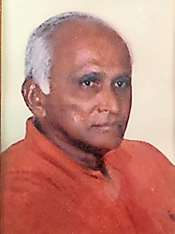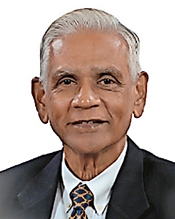Appreciations
View(s):Remembering the ‘friendly father’ behind the great teacher and disciplinarian
E. T. Eusiri De Silva
 January 28, marked the first death anniversary of our beloved dad, E. T. Eusiri De Silva. It is also the birthday of my eldest son, his eldest grandson, who we all thought was his favourite.
January 28, marked the first death anniversary of our beloved dad, E. T. Eusiri De Silva. It is also the birthday of my eldest son, his eldest grandson, who we all thought was his favourite.
What has surprised me the most is how much I think about and miss him and the fact that when he was alive, I never really thought of him the way I do now, not realizing how much he meant to us.
All my life, I used to think of him as just my father who would be there for us. The way I thought of him as an adult was the same way I used to think of him when I was a small boy growing up. He would just do things for us whenever we needed him. I didn’t have to think twice about it, he was that dependable and I trusted him more than I would trust myself.
For many who knew him, he portrayed the image of a strong disciplined person who would be firm on his principles and beliefs, and that was true. But I recall how much fun he was andhis witty sense of humour.
Once when we were kids, we pulled a practical joke on him and my mum said “Eusiri, you are the master in charge of discipline at Nalanda College and you cannot control your own three sons!”This is when he said he wanted to be remembered as the “friendly father”.
My father was a very proud person. He never felt that he was a lesser person than anyone else and he never lived his life to show off to others. A phrase he used to say that I try and live my life by is “Cut your cloth according to your means.”
When he was a teacher at Nalanda College and rode a motorcycle, he used to provide private tuition to some of the most powerful families in the country. He used to teach President J.R. Jayewardene’s grandson, Gamini Dissanayake’s children, Ranil Wickremesinghe’s brother and niece, K. N. Choksy’s son and even the current deputy chairman of this newspaper group, Sujan Wijewardene whom he used to fondly talk about with us at home. But he never used any of them to gain personal favours.
As a teacher, it was amazing how much respect he had from his students. Whenever he went to a bank, went to clear some goods from the port or to a government department, there was always one of his former students who would come up to him and say “Sir, you might not remember me but you taught me. How can I help you?”
A few years before his death, when he was at an ATM, one of his famous former students, Sri Lankan cricketer and current ICC match umpire Kumar Dharmasena was there and fell onto his knees and worshipped my dad on the road. It showed what a humble person Kumar is and also the respect that my dad received from his students.
There is so much I can write about my dad but there is not enough space to do so. We miss you but you are always in our thoughts and prayers. Rest in peace Dad.
Travis de Silva
He was a charismatic and inspiring leader
Earnest Ananda Gunasekara
 One year has passed since the demise of Earnest Ananda Gunasekera, a noble banker, great mentor and selfless educator. Born in January 1936 in Tangalle and educated at Christ Church College, he reached the pinnacle of the banking industry in an era when banking was controlled by the elites in the city.
One year has passed since the demise of Earnest Ananda Gunasekera, a noble banker, great mentor and selfless educator. Born in January 1936 in Tangalle and educated at Christ Church College, he reached the pinnacle of the banking industry in an era when banking was controlled by the elites in the city.He commenced his banking career at Bank of Ceylon, Galle in 1955 and later moved to the Foreign Department. He also worked at the Current Accounts Department, broadening his knowledge in domestic banking.
Mr. Gunasekara joined the People’s Bank during its formative years, and played a vital role in developing the trade finance side of the bank. He was a charismatic and inspiring leader, uniting officers with divergent attitudes with skill and sensitivity.
In 1966, he was elected as an Associate of the Chartered Institute of Bankers, London. Whilst at the People’s Bank, he nurtured young bankers, conducting banking lessons and sharing knowledge without expectation of any personal benefit.
In 1972, Mr. Gunasekera joined the Ceylon Savings Bank. He was the first Manager of their Fort Branch and was also the last General Manager of the Bank.
After a short stint of two years at NSB, he joined the Commercial Bank of Ceylon as the Executive-in-Charge of the Exports Dept and was later promoted as the Manager of the Foreign Dept. The economy was liberalising in 1977 and this resulted in a tremendous upsurge in trade finance activities. Mr. Gunasekara played a pivotal role in formulating and implementing processes, thus steering the growth of the Foreign Dept to meet the challenges brought about by the open economic policy. Being the Manager of the Foreign Dept, he received many opportunities for overseas training and visits to overseas banks, but passed them over to his colleagues allowing the development of the next level of management.
His selflessness was also manifest in his efforts to teach and nurture the next generation of bankers. Like my wife and I, who joined the Foreign Department during this period, most of the staff were young school-leavers. Mr. Gunasekara conducted weekend training sessions for young staff and always encouraged his mentees to pursue further qualifications. He was a father figure, going above and beyond his professional duties – he provided guidance on matters both professional and personal. There was never an expectation of allegiance from the staff. I quote a senior banker who said that Mr. Gunasekara was “a gentleman of exceptional qualities”; a sentiment echoed by many in the profession.
In 1982, Sunil Saksena, a Senior Executive from Bankers Trust Company of New York, impressed by Mr. Gunasekera’s knowledge, experience and network in the local banking industry, invited him to set-up and head the cash management and trade finance operations of Bankers Trust Company (BTC) – New York, in Sri Lanka as its Representative. Due to Mr. Gunasekara’s reputation, undoubted integrity, and amiable personality, he was able to get most banks in Sri Lanka including foreign banks, to establish correspondent relationships with BTC. Mr. Gunasekera commanded high respect from BTC – New York. He moved to Deutsche Bank AG, Colombo, when Bankers Trust was acquired by Deutsche in 2000.
Mr. Gunasekara played an enormous role in the formation of Sampath Bank. The success of Sampath Bank in changing the landscape of banking in the country, is truly a tribute to his relentless behind the scene efforts. He continued to function as an Honorary Consultant to the Chairman during its formative years. All senior management personnel were identified and recruited by Mr. Gunasekara at the inception. Being a visionary, he wholeheartedly supported the Founder General Manager Janaka de Silva’s proposal to have a fully computerised bank from the outset.
Though Mr. Gunasekera spent immeasurable time and energy in his consultancy role, he declined to accept any remuneration for the noble services he rendered. He valued his independence more than money, a rare human quality. Mr. Gunasekara did not accept the invitation to join the first Board of Directors, as he felt it would be inappropriate whilst holding the position as the Representative of Bankers Trust Company.
However, subsequent to his retirement from BTC, he accepted the invitation of the then Managing Director Edgar Gunatunga to join its Directorate. He served as a Director for 10 years and was thereafter appointed to the Board Advisory Committee. During the same period, he was also a Director of several associate companies of Sampath Bank including Union Bank of Colombo.
Mr. Gunasekera was a founder member of the Association of Professional Bankers and was its first Treasurer. He continued to be an active member, and in recognition of his valuable services, he was conferred the prestigious award for “Outstanding Contributions to the Banking Industry”. He was also a founder member of Trade Finance Association of Bankers – Sri Lanka and was its President for two years.
He valued his simple life despite reaching the heights of his profession and was very much a family man. He enjoyed retirement surrounded by his wife, three daughters and grandchildren.
A disciplined man, he enjoyed his daily morning walks, a ritual he carried from his People’s Bank days. The last time I visited him, about 1 ½ years before his death, he said he had then reduced the morning walks. Pointing to a chair inside the house, he said when he went out, his wife Padma would sit there watching the entrance until he came back. Such was their bond!
With the demise of Mr. Gunasekera on December 24, 2019, we lost a visionary banker and unique human being. The enormous vacuum created by his departure, cannot be filled easily. The loss and sadness was felt by many. Needless to say, his wife Padma would have felt it most. In fact, she too passed away on December 30, just six days after. May the samsaric journey of both be shortened!
Sisira Herath
A towering, impressive and dynamic personality
M.A.C.M. Saleh
This is a tribute to the memory of M.A.C.M. Saleh who was a towering, impressive and dynamic personality who along with Muslim leaders of the time enthusiastically supported the demand for dominion status and also for independence for the country.
They have never obstructed the political progress of the country but forged close and intimate bonds of friendship with the Sinhala people.
Mr. Saleh was interested in matters concerning the abolition of minority representation in 1923 and the introduction of the Donoughmore constitution. He was not satisfied even with the Soulbury constitution in that the Muslims interests were not adequately safeguarded. Sir Razik Fareed and Sir Mohamed Macan Markar went to Lord Soulbury to complain about their grievances. Mr Saleh said that the minorities should get not just safeguards but adequate safeguards. He supported the principle of weightage, and referred to the Lucknow Pact of 1916 in India where both the Hindus and Muslims agreed to give more than what their numbers demanded in this pact. Before the granting of independence to India and Pakistan, the British gave equal representation to Hindus and Muslims. Dr. Ambedkhar who drafted the Indian Constitution, enumerated the rights of Muslims and other minorities in the constitution.
Mr. Saleh was closely associated with Dr. T.B. Jayah with his efforts to enhance the political rights of the Muslims. Dr. T.B. Jayah said we cannot have a government perpetually entrenched in power with a racial and religious majority in control under the forms and trappings of a Parliamentary system of government. Democracy he said was that every individual citizen of this country had the right to free and equal participation in the affairs of this country without any hindrance or obstruction.
It is my fervent hope and belief that all religions and communities should extend peace, friendliness and goodwill to each other.
Zem Zem Akbar



